The Grand Ole Opry (39 page)
Read The Grand Ole Opry Online
Authors: Colin Escott
People say the top stars are either on the road, in the studio, or on vacation, but there are many artists, many top artists,
who share the special connection with the Opry and will make it a priority in their career. It brings context to what they
do. They know where the music’s been and they visit with the people who forged it. They see new artists who give us a hint
of where the music might be going, and they reconnect with their place in the whole scheme. What we have to do is stay out
in front of contemporary performers who are still building their careers. We want to return the Opry to being a star-making
machine in country music, and we want to nurture the people who will still be in country music thirty years down the road.
STEVE BUCHANAN:
When you’re entrusted with an iconic institution like the Grand Ole Opry, you can’t help thinking of how the decisions you
make today will impact the Opry in ten or twenty years. We not only want to build relationships with artists at an early point
in their careers, but we want to build relationships with the music industry in general. Then, as a young artist’s career
builds, we’re hopeful that they’ll want to continue the relationship with the Opry and make the show part of their future.
There are wonderful rewards and dividends conferred by Opry membership. Many of them are emotional and speak to the relationships
among the artists. The Opry has never been about financial compensation, but we want the show to play a role in developing
careers on different levels. Opry membership confers recognition that you simply don’t get elsewhere.
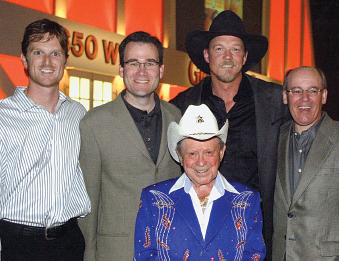
John Dennis (Adkins’s management company), Steve Buchanan, Jimmy Dickens, Trace Adkins, and Gaylord Entertainment President
and CEO Colin Reed pose backstage the night Adkins was invited to join the Opry cast.
PETE FISHER:
You don’t persuade artists to join the Opry. If it takes persuasion, they’re probably not right for us, nor we for them. In
some artists, it’s just inherent to respect all that the Opry stands for, and there is value for them in appearing on the
show. The great thing about country music is its connection to where it comes from, and that continuum is a powerful factor.
You measure the health of the Opry by the attendance of artists from all generations and customers from all generations. My
dad stocks trout in his ponds and he says that to keep the ponds healthy you need a little stream of water coming in and a
little stream going out, and that’s how it is with the Opry.
Among longtime cast members, there is some resentment that the newer artists don’t appear regularly, but the Opry is attracting
top new stars, such as Dierks Bentley and Brad Paisley, who are on the road up to three hundred days a year. In fact, the
Opry—in the person of Marty Stuart—had to catch up with Dierks in Los Angeles to ask him to join. (Ironically, Dierks had
been a researcher for TNN earlier in his career, and spent so much time backstage that Opry manager Pete Fisher asked him
to back off.)
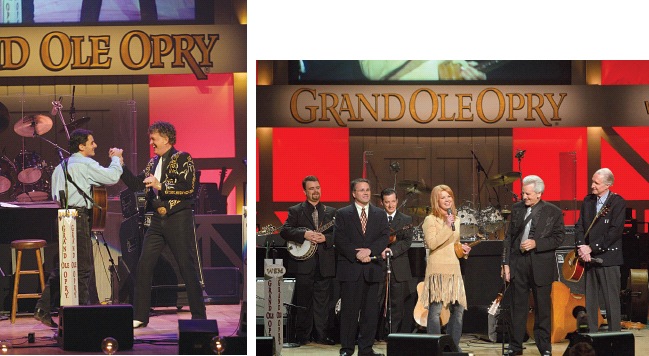
left: Brad Paisley and Bill Anderson, October 2001.
right: Opry members Patty Loveless and George Hamilton IV (right) are joined by Opry general manager Pete Fisher in welcoming
Del McCoury to the Opry cast. Looking on are Rob McCoury and Jason Carter.
RICKY SKAGGS:
Some members of the Opry don’t show up much as I’d like. I know the dollars are out there, and it’s hard to give up those
weekends. But one day, those weekends won’t be there, but the Opry will still be here, and it’ll be nicer to come back if
you’ve invested. My son and I have this thing we call our love bank. Every time I hug or kiss him we make a deposit in the
love bank. It’s kind of like that with the Opry. Every time I come here on weekends, I feel like I’m depositing something.
It’s the history of the future.
BILL ANDERSON:
If I’m in Nashville on a Friday or Saturday night and I’m not at the Opry, I feel like I’m playing hooky and I keep waiting
for the truant officer to come and throw me in jail. Sure I take time off and I’m not there every time that they open the
doors, but I take membership very seriously. The dollars have changed so much. Artists today can make more in one weekend
than we made in a year when I first came to Nashville. But a lot of younger artists are very rooted in the Opry and what it
means because they’ve taken the time to study where country music comes from. Some of the newer artists, of course, could
care less and came into country music from other areas. So you can’t say that all the young artists appreciate the Opry, but
a lot of them have heard from their parents or grandparents what the Opry’s all about and they want to be a part of it. The
other thing is that these young artists are selling a lot of records and drawing a lot of crowds right now, but there will
come a time when that slows down for them, and hopefully when it does, they will come and spend more time at the Opry. We
all owe a debt to the Opry, and we all ought to be willing to make payments on that.
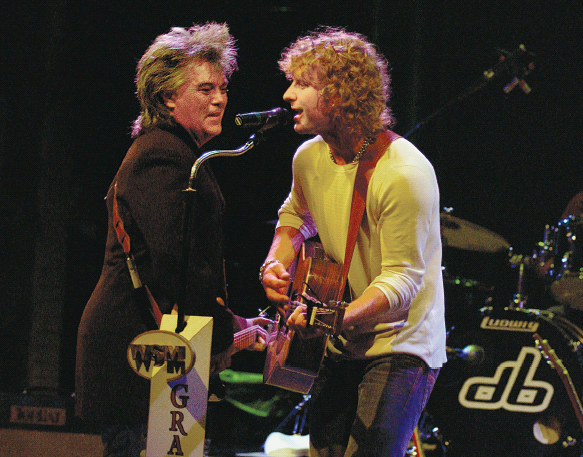
Marty Stuart surprises Dierks Bentley at a Los Angeles concert appearance with an invitation to join the Grand Ole Opry on
July 26, 2005.
HAL KETCHUM,
Opry star:
I’ve just started to realize the true meaning of the Opry. The community backstage is as important as the time onstage. It’s
an opportunity to wander through and hear Ralph Stanley and his band warm up, and feel the energy of this music. There are
apprentices and there are masters. If you are interested in any way, shape, or form in this great American art form, the Grand
Ole Opry is the source. To me, country music is poetry and polyester. Simplicity is a very hard thing to achieve. Anyone can
be clever.
PETE FISHER:
You look out at the audience and you literally see a three-year-old and a ninety-three-year-old. Then the Opry is a celebration
of the generations. It’s diversity sharing the same stage, and it’s so rare today.
STEVE BUCHANAN:
The average age of our audience varies from night to night. We feel that we are seeing more young patrons as we bring in more
new and developing artists. It adds to the diversity of our programming and to the diversity of the audience. Ed Clark took
some famous photos when the Opry was at the Ryman in the 1940s. There’s a shot of a flatbed truck with three generations coming
off the back. We still have that today with three generations sitting together enjoying the show as a family. To me, a really
great night at the Grand Ole Opry reflects the diversity in style and genres and age groups. You’ll have comedy, bluegrass,
western music, legends, and some of the brightest new stars. A great night at the Opry really shows the world the breadth
and depth of country music. Those shows are just magical. Things take place here that can’t take place anywhere else, and
those are the times that will give you chills.
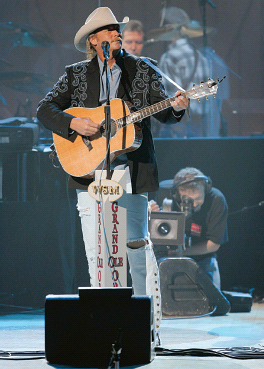
Alan Jackson chose the Grand Ole Opry for the location of his video for the song, “Too Much of a Good Thing.”
BILL ANDERSON:
Sometimes there’s just the right mixture of the old and the new. It’s not possible to get that every night, but there are
nights when that perfect mix just seems to be there. The younger fans get tuned in to some of the older artists, and the older
fans accept some of the younger acts. When that happens, the Opry is the most electric place in the world. The eightieth anniversary
show is a case in point. I got a call from Pete Fisher on the Thursday before the Saturday show. He said he’d called Garth
to ask him what he was going to sing, and he said, “I want to do a medley with Jimmy Dickens, Porter Wagoner, and Bill Anderson.”
I think it was his way of saying that those of us who’ve been here a while should be honored. It was a very generous, kind,
and giving thing for him to do because he could have come out there and taken over the stage with his own hits. He said, “I’m
coming out of retirement to honor the Opry,” and the way he did it by performing with us was a wonderful way to honor the
Opry. I’d always liked Garth and my admiration for him went up tenfold.
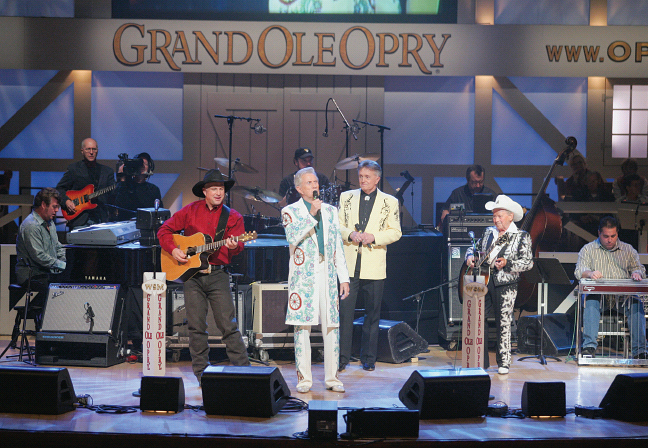
Garth Brooks, Porter Wagoner, Bill Anderson, and Little Jimmy Dickens perform at the Opry’s eightieth birthday bash.
DOUG GREEN
of Riders in the Sky:
The experience is so rich. In one evening, you can hear Jimmy C. Newman do Cajun music, and you can see the hottest young
belly button do her thing, followed by a legend like Billy Walker or Jack Greene, and then great bluegrass like the Osborne
Brothers. I love it when Ray Pillow comes on and does those two-step shuffles. Nobody else is doing that anymore. But the
real magic of the Opry is when someone like Vince Gill will come out and sing a tune with us. Once, we sang with Roy Rogers
on the Opry stage. We call those Grand Ole Opry moments. Often completely unplanned.
JEANNIE SEELY:
They open the doors and raise the curtain and say, “This is the Grand Ole Opry,” and we all know anything can happen. It’s
the freedom, I guess. The freedom allows spontaneity, and encourages people to work together.